Some of our favorite SFF protagonists tend to form their own circles, building communities with those that love them for who they are. Around the holidays, these stories offer a gentle reminder that there are many ways to define family, and plenty of reasons to spend time bonding with the people who mean the most to you even if you’re not strictly related.
These five stories celebrate found families and the wonderful, unconventional love they share.
The House in the Cerulean Sea by T.J. Klune
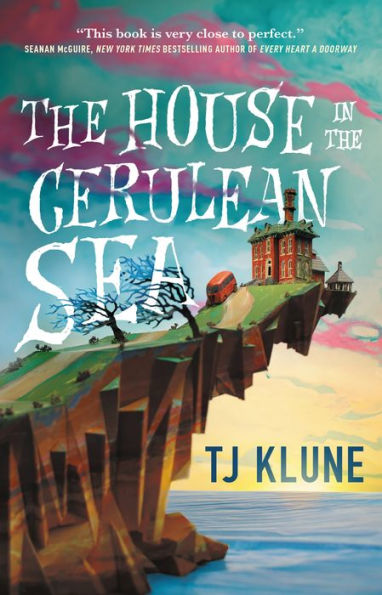
Let’s start with the most heartwarming story on the list (possibly of all time?). The House In The Cerulean Sea follows Linus Baker, a caseworker for the Department In Charge Of Magical Youth. He’s sent on a unique assignment to a mysterious house where a group of charming magical young ones are being raised by the enigmatic Arthur Parnassus.
As Linus learns more about the children—the Antichrist, a blob, a were-pomeranian, and a gnome, to name a few—he discovers the family he never had.
Cerulean Sea packages hundreds of lessons and wise quips into its pages; my personal favorite is the way the story teaches how to understand and appreciate the impact others can have on you. In this case, Arthur Parnassus plays a big role, but the kids are the stars. They introduce Linus to new ways of thinking, and they teach him that the ignorant bliss of childhood can give way to a personal epiphany. Linus, stuck in a corporate job he’s convinced himself is the life he wanted, blossoms into a loving person willing to embrace others for all their glorious differences.
During the holidays, that’s an important lesson. Surround yourself with people who ignite positive change within you, and who can lift you up even when you think there’s nowhere left to grow.
The Lies of Locke Lamora by Scott Lynch
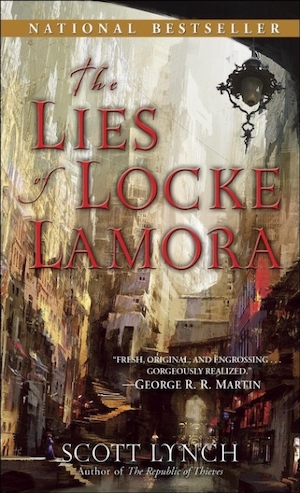
Warning: this found family comes with loads more swearing and vulgarity than the crew from The House in the Cerulean Sea. And I love it for that.
The Lies of Locke Lamora takes an orphan boy and deposits him into a cutthroat underground thieving network. Locke quickly misbehaves himself into being evicted from that dubious crew, and the Thiefmaster pawns him off to Father Chains. Father Chains, under the guise of a blind priest, weaves complex schemes far beyond the simple pickpocketing of Locke’s former world.
Our story introduces Locke to a father figure and a found family comprising two sneaky twins, a rookie thief, and a sharp-minded bruiser. The latter, Jean, becomes Locke’s best friend, and the two grow as close as brothers.
Scott Lynch’s first Gentleman Bastards novel brings the found family motif to life by creating hope where there once was none. Cast out from their lives through no fault of their own, Locke and the crew find love and comfort in the camaraderie and relative safety that Father Chains provides. Oh, and they love robbing the rich, which is just a bonus.
Locke and company form a tight-knit squad of proficient-if-inexperienced thieves, and watching them grow together is a real treat. Locke Lamora doesn’t over-idealize the lives of this found family, either. For every gut-busting string of vulgar insults, thrilling theft, or heartfelt memory, Lynch doles out profound sadness and heartache in equal measure.
(Also, for those who’ve been missing travel this year, Locke Lamora is set in a fantasy world reminiscent of Venice, Italy. Come for the found family, stay for the Venice vacation vibes!)
The Long Way to a Small, Angry Planet by Becky Chambers
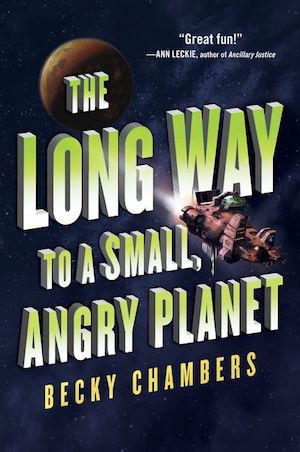
Looking for a classic pew-pew, world-ending-weapons-filled science fiction tale? Look elsewhere. Becky Chambers opts for a heartfelt exploration of friendship and connection in The Long Way To A Small, Angry Planet, the first of the Wayfarers series.
Rosemary Harper’s father is a galactic pariah, and she seeks refuge from the baggage of her family name aboard the Wayfarer. Captain Ashby leads a small crew of spacefaring folks, punching through spacetime to create interstellar superhighways. It’s honest work, but it’s risky. And it requires trust.
The Wayfarer’s crew includes Rosemary and Ashby alongside Kizzy and Jenks, the engineers; Sissix, the pilot; Dr Chef, the otter-like doctor and cook; Artis, the biologist; Ohan, a Sianat pair and the ship’s navigator; and Lovey, the AI that runs the ship.
They don’t all get along, but they share common goals and the need for emotional connection—Chambers offers this to readers in spades, and the found family of the Wayfarer grows closer as the challenges of space-time tunneling put increasing pressure on them. Angry Planet also features a diverse interspecies cast that allows the reader to appreciate the advantages and variety of experience and perspective that difference can bring.
The book has a lot to say, but one point sticks out: You can forge connections with anyone if you open your heart, listen to others, and find common ground. This tale of love and acceptance (and cool sci-fi concepts) has a full roster of relatable and lovable characters ready-made for holiday readers eager for the warm embrace of found family.
Mistborn by Brandon Sanderson
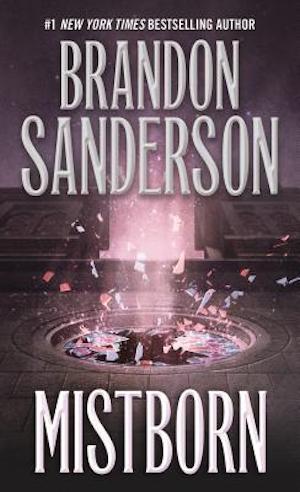
Brandon Sanderson has a knack for writing characters who feel very real and relatable. Their struggles, though coated in a layer of fantasy frosting, feel true to our world. Mistborn is a prime example.
Forgotten by the world and abandoned by her brother, Vin gets by on scraps and good luck (which may be more magical in nature than she believes). When she encounters the fearless Kelsier, he ropes her into a scheme that could topple the ruling empire that’s lasted for 1,000 years. The fantasy heist is all fine and dandy, but Vin first has to get on board with both the plan and the people executing it.
Her journey is marvelous. Kelsier’s ragtag crew doesn’t put on a show for Vin. They are firmly themselves, playfully prodding her with jibes or quick comments. Practically overnight, Vin must learn to trust those around her as they learn to do the same.
I think there’s a bit of Vin’s found family arc in all of us. As we learn who we are, we’re also forced to negotiate the mystery of others, sussing out who we can trust and who will love us for who we are. Personal growth can come from within, but it’s also catalyzed by the people surrounding us. Vin’s experiences with Kelsier, Ham, Breeze, Spook, Sazed, and the crew show us how a found family can contribute to our discovery and acceptance of self.
And if you enjoy Vin’s found family in Mistborn, you’re in luck! The remainder of the trilogy expands on her tale and carries the found family theme forward.
The Umbrella Academy by Gerard Way and Gabriel Bá
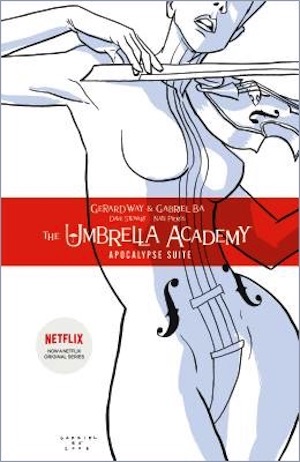
Maybe “found family” isn’t the right phrase here. “Forced family” might be more fitting. After all, Reginald Hargreeves paid the mothers of seven superpowered children to let him raise them.
But that’s exactly why Umbrella Academy deserves a spot on this list. The father figure of the crew represents the dark side of this family situation. But the children and the ultra-intelligent chimpanzee butler learn to navigate shared familial trauma together, for better or worse. Gerard Way and Gabriel Bá do an exquisite job of bringing this to life in the graphic novel series, though it’s done to glorious effect in the Netflix adaptation, too.
Faced with the end of the world, how can a group of superpowered pseudo-siblings grapple with their shared experience and recover? Umbrella Academy takes the worst-case scenario and finds glimmers of hope with it, from Klaus and Ben’s torrid communications across planes of existence to Vanya’s discovery of her latent abilities. The Hargreeves children seek answers, and only when they trust one another do they ever find them.
Apocalyptic and violent, Umbrella Academy isn’t for everyone, but there are nuggets of found-family goodness that are hard to pass up, here.
***
Originally published November 2021
Cole Rush writes words. A lot of them. For the most part, you can find those words at The Quill To Live or on Twitter @ColeRush1. He voraciously reads epic fantasy and science-fiction, seeking out stories of gargantuan proportions and devouring them with a bookwormish fervor. His favorite books are: The Divine Cities Series by Robert Jackson Bennett, The Long Way To A Small, Angry Planet by Becky Chambers, and The House In The Cerulean Sea by TJ Klune.










